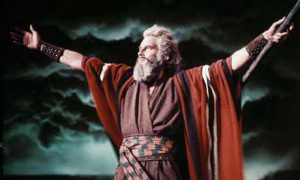 THEY’VE BEEN making films about Moses since at least 1907, when the Pathé studio in France released Moses et l’Exode de l’Egypte. The Vitagraph company in America followed suit with J. Stuart Blackton’s five-part The Life of Moses, released between 1909 and 1910. Moses has popped up in movies ever since, from the all-black cast of The Green Pastures (1936), starring Rex Ingram as ‘de Lawd,’ to Mel Brooks’ randy satire History of the World Part I (1981).
THEY’VE BEEN making films about Moses since at least 1907, when the Pathé studio in France released Moses et l’Exode de l’Egypte. The Vitagraph company in America followed suit with J. Stuart Blackton’s five-part The Life of Moses, released between 1909 and 1910. Moses has popped up in movies ever since, from the all-black cast of The Green Pastures (1936), starring Rex Ingram as ‘de Lawd,’ to Mel Brooks’ randy satire History of the World Part I (1981).
And then there are the feature-length films:
The Ten Commandments (1923). The Exodus takes up only the first half of Cecil B. DeMille’s silent flick, but it’s worth seeing just for that. Inspired by the 1922 discovery of King Tut’s tomb, it also boasts some of the earliest Technicolor photography and special effects that are impressive even today for their low-tech ingenuity. The film’s second half is a laughably heavy-handed morality tale meant to show the relevance of God’s laws to the Jazz Age: if you tell a lie, your mother may die in a freak construction accident, that sort of thing. “Laugh at the Ten Commandments all you want, Danny — but they pack an awful wallop!”
The Ten Commandments (1956). DeMille’s last film as director is more concerned with American political ideals during the Cold War than with anything particularly biblical. Still, it’s got a great cast, a superb score, spectacular cinematography and award-winning special effects. Even though it packs its nearly four-hour length with some of the most overwrought dialogue in film history, it never gets boring; in fact, it’s quite fun, in a campy sort of way. Charlton Heston was cast in the lead because his profile resembled that of Michelangelo’s Moses; all things considered, he plays the part of a statue rather well.
Moses (1975). Easily the worst of the bunch, as far as production values go, but director Gianfranco DeBosio does stick closer to the Bible than DeMille ever did, and he makes a point of highlighting some of the more troubling aspects of Moses’ career, such as the death sentence he gave to a man caught gathering sticks on the Sabbath. Condensed from the TV mini-series Moses: The Lawgiver, it was produced by Vincenzo Labella and co-written by Anthony Burgess, who later collaborated on the more successful Jesus of Nazareth.
Wholly Moses (1980). In the wake of Monty Python’s Life of Brian came this American spoof of that other biblical narrative. By all accounts a lacklustre effort, it stars Dudley Moore as a Hebrew prophet named Herschel, Richard Pryor as the Pharaoh and John Ritter as Satan. Hard to find on video, but why bother trying?
Moses (1996). The most human and compelling portrayal of Moses to date. Ben Kingsley delivers a wonderfully warm, complex, and ultimately ecstatic performance in the title role, wrestling with his doubts when God’s plans seem to fail and laughing with joy when they succeed, as when God parts the Red Sea and appears before the people of Israel at Mount Sinai. One of the best films yet from the producers of ‘The Bible Collection.’
— A version of this article was first published in BC Christian News.












